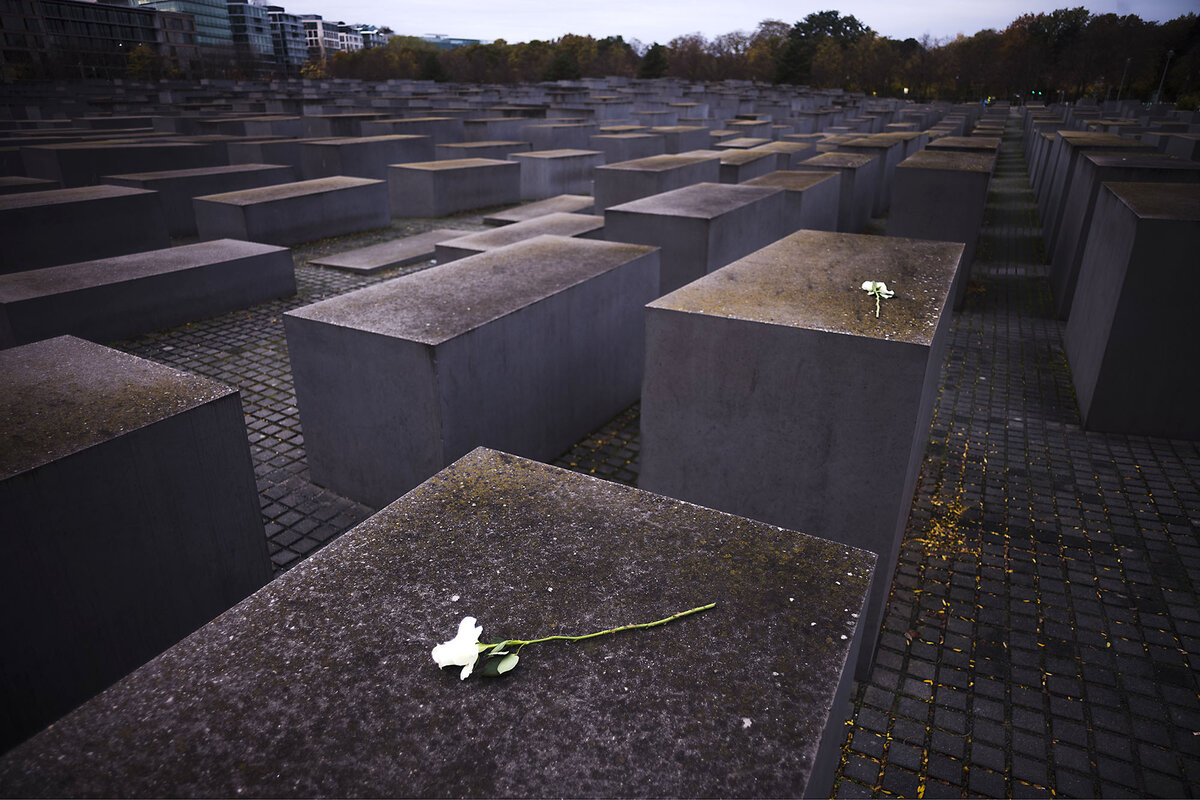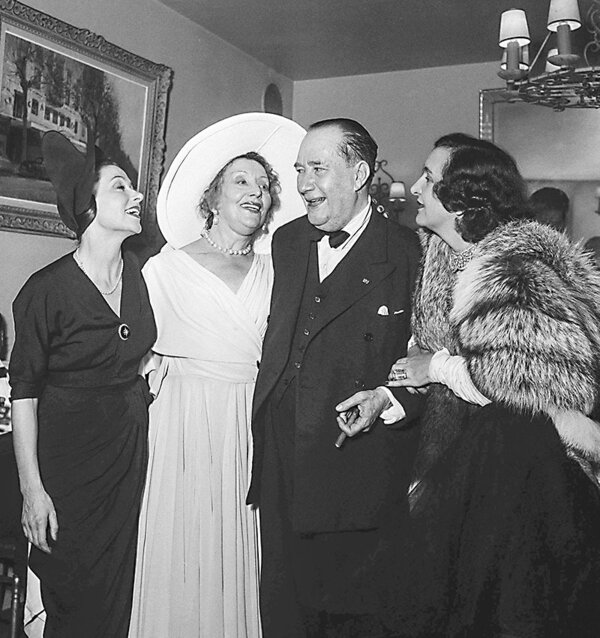A different gold medal – for gentile diplomats who quietly saved Jews
Loading...
| Washington
In 1938, Chinese diplomat Ho Feng Shan witnessed a reign of terror descend on Austria.
Germany annexed the country in March, and the new Nazi government and its allies were attacking Jews on the streets, seizing their property, and arresting Jewish leaders. Even before the Kristallnacht pogrom that fall, Jews were lining up outside Mr. Ho’s consulate, desperate to leave – but unable to without an entry visa or boat ticket to another country.
Like many countries, China – which was at war with Japan, and seeking military and economic support from Hitler’s Germany – was not inclined to take in Jewish refugees. But unlike many other diplomats, Mr. Ho issued visas to Shanghai to anyone who asked him.
Why We Wrote This
A story focused onA bill in Congress would honor 60 diplomats who helped Jews escape the Holocaust. Amid a spike in antisemitism and a growing generational knowledge gap, proponents say it offers a timely reminder of both the atrocities and selfless heroism of that time.
Some Jews used those visas, secured by Mr. Ho, to travel through the Soviet Union to China; others used the paperwork to get elsewhere, such as Cuba.
But for all, the Shanghai visa was the ticket to safety.
Now, on the eve of the 80th anniversary of the end of the Holocaust, advocates are urging Congress to posthumously award Mr. Ho and 59 other diplomats a congressional gold medal for risking their lives to save hundreds of thousands of Jews. The House passed the measure on June 11. If the Senate joins in passing it, a medal will be presented collectively to the families of those diplomats, and then be displayed in the U.S. Holocaust Memorial Museum in Washington.
Proponents say that they hope that elevating these stories will help a new generation gain a clearer picture of both the Holocaust’s devastation and the selfless heroism that accompanied it. The diplomats’ actions, they add, demonstrate the power of ordinary people acting according to conscience despite the personal risk or punishment they may face for doing so. And supporters of the bill say a rise in antisemitism makes honoring heroes of the Holocaust timely, especially amid a growing generational knowledge gap.
Nearly 10% of millennials have not heard of the Holocaust, according to a 2018 nationwide survey conducted by a nonprofit that pursues compensation for Holocaust survivors. In addition, it found that 41% of millennials thought 2 million or fewer Jews were killed, well below the actual death toll of 6 million. Nearly half could not name a single concentration camp, and even when presented with the name “Auschwitz” – the largest such camp, where more than 1 million Jews were killed – more than a third were not sure what it was.
Meanwhile, in 2021, the number of antisemitic incidents in the U.S. hit their highest level since the Anti-Defamation League started tracking them more than 40 years ago. That number then more than tripled to 8,873 in 2023, with a spike following Hamas’ invasion of Israel on Oct. 7.
“We need to remember that we have to fight this evil anywhere we see it come up and remember how it has impacted our world and past,” says Sen. Pete Ricketts of Nebraska, a Republican co-sponsor of the bill.
Most of the 60 diplomats that the Forgotten Heroes of the Holocaust Congressional Gold Medal Act would recognize are relatively unknown. Very few sought or gained any recognition during their lifetimes for their courageous actions on behalf of Jews during the Holocaust, says Ezra Friedlander, CEO of the Friedlander Group, who lobbied for the act.
He credits the diplomats as individuals “who went out of their comfort zone and did something extraordinary to save people who they had no connection to – just that they were fellow human beings, sharing Planet Earth with them.”
There’s a larger lesson in everyday people making a difference with the skill sets they have, as these diplomats did, says Samantha Abramson, executive director at Nathan and Esther Pelz Holocaust Education Resource Center in Milwaukee.
“I look at it as an exercise in what democracy can and should be,” she says.
Quiet integrity
It didn’t take long for word of Mr. Ho’s defiance to spread, according to records of Mr. Ho and his actions available through Holocaust organizations, including Israel’s Yad Vashem Holocaust memorial in Jerusalem. When his supervisor in Berlin caught wind of what the Chinese diplomat was doing, he ordered him to stop. A few months later, the Nazi government claimed that Mr. Ho’s consulate was a Jewish-run building and shut it down.
When Mr. Ho asked the Chinese government for funds for a new office, he was refused. So he paid for a new building out of his own pocket, continuing to give out visas to any Jews who asked him. He also took to walking Jewish families home and sometimes staying with them, so his diplomatic status could protect them from violence.
In 1939, Mr. Ho received a demerit, or censure, and was reassigned to New York the following year. He continued his diplomatic career until his retirement in 1973, but he was denied his pension.
Mr. Ho rarely spoke about his time in Austria, but a 2007 op-ed by his daughter in a Chinese newspaper gave some insight into his motives. Following a century of foreign imperialism in China and the humiliation that brought, she wrote, he was “very sensitive to persecution and to the bullying of any peoples.”
After his death, Mr. Ho has sometimes been hailed as “China’s Schindler,” a reference to Oskar Schindler, a German industrialist who saved more than 1,000 Jews by employing them in his factories.
Defying the law
“The Oskar Schindler of Brazil,” who served as ambassador to France during the Nazi occupation, similarly issued visas illegally. In contrast to Mr. Ho, however, Luis Martins de Souza Dantas issued a passionate verbal defense of what he had done.
At that time, Brazil secretly banned Jewish immigrants. That did not stop Mr. Souza Dantas from issuing hundreds of visas to Jews seeking to escape the Nazis. When he received complaints, he simply marked visas with a date before the complaints.
In 1941, the Brazilian government opened an inquiry into his actions. In response, Mr. Souza Dantas wrote, “I did what, given the nobility of soul of the Brazilians, the most cold-hearted of them would have done, moved by the most elementary sentiments of Christian piety.”
He was able to avoid a trial on a technicality.
An unlikely spy
Capt. Frank Foley is another example of unwavering defiance – but he ran an even stronger risk than Mr. Schindler, who was needed for the German war effort, or the two diplomats, Mr. Ho or Mr. Souza Dantas, who could have claimed diplomatic immunity.
Mr. Foley served as Britain’s top spy in Berlin during the war. His cover job as head of the British Passport Control office in Germany enabled him to help an estimated 10,000 Jews escape Nazi rule.
Mr. Foley and his wife also hid Jews in their apartment, and he sometimes even entered concentration camps to save people imprisoned there by presenting false visas to the guards.
One of those whom he rescued, Elisheva Lernau, was present in 2004 when Mr. Foley was honored at the British Embassy in Berlin.
“I owe my life to this man I never met, a man of humanity in a time of unparalleled inhumanity,” she said.
Mr. Foley acted in defiance of both German and British law. Had he been caught, his status as a spy would have stripped him of diplomatic immunity, and he could have been imprisoned or executed.
Proponents of the bill say that they want to remember the antisemitism of the past and address its threat today. “The world will forever grapple with the dark questions of the Holocaust,” said Virginia Sen. Tim Kaine, the original Democratic co-sponsor, in a statement.
The bill's supporters hope to shine a light on the heroes as well.








